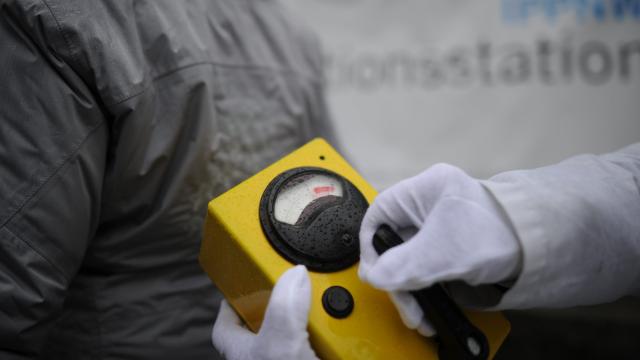A doctor who treated survivors of a mysterious nuclear accident in Russia was told that the radioactive isotope cesium-137 must have made its way into their body due to “Fukushima crabs,” according to CNN.
The August 8 incident at the Nyonoksa testing range on a platform in the White Sea has not yet been fully explained, but at least seven individuals have been reported dead after what nuclear agency Rosatom described as an accident involving an “isotope power source for a liquid-fuelled rocket engine.”
It later emerged that the incident was serious enough that Russian officials in Arkhangelsk wavered over the issue of whether to issue evacuation orders for nearby towns.
While several of the personnel deaths were due to an onsite explosion, the Washington Post reported this week (citing the Novaya Gazeta newspaper) that two individuals had died of radiation exposure before they could be taken to Moscow for treatment.
Radiation levels in the nearby city of Severodvinsk spiked to 16 times background levels, according to the Russian Federal Service for Hydrometeorology and Environmental Monitoring, which is a level not expected to have consequences for human health.
According to the Post report, medical workers at a regional hospital were not informed that three patients who arrived after the accident had possibly been exposed to radiation. One source said that after cesium-137 was detected in an emergency room, doctors and nurses using only face masks for protection had to decontaminate the room. They were later forced to sign nondisclosure agreements stating that any information about the incident is a state secret, the Post wrote.
The local health ministry blamed the detection of cesium-137 in one doctor’s body on food, according to CNN:
Despite the doctor’s exposure to patients from an area where a short-term radiation spike was recorded, the local health ministry blamed the trace amounts of the isotope on bad seafood.
“Cesium-137… has the feature of accumulating in fish, mushrooms, lichens, algae,” the statement posted on the local government’s website reads. “With a certain degree of probability, we can assume that this element got into the human body through the products of food.”
According to Meduza, a Riga-based investigative outlet, health officials told the doctor the cesium-137 detected was likely related to a recent vacation to Thailand. An employee at the hospital said that the health officials told the doctor, “You just ate Fukushima crabs there” — referring to a series of meltdowns at Fukushima Daiichi Nuclear Power Station in 2011 following the catastrophic Tōhoku earthquake and tsunami.
While some cesium-137 has been detected in oceanic wildlife, most of the scientific community believes it has been diluted to levels unlikely to impact human health.
The incident itself is widely suspected to have involved a prototype Russian weapon known by NATO as SSC-X-9 Skyfall, a type of nuclear-propelled cruise missile theoretically capable of striking any point on the surface of the Earth.
These kinds of missiles are designed to evade antimissile defence systems such as ones currently operational in Alaska and California, according to the New York Times, and Russian President Vladimir Putin has sought to portray them as almost impossible to stop from reaching their destination — though early tests of the weapon have all fared poorly and the U.S. tried and failed to build similar weapons systems in the 1950s and 1960s.
As the Bulletin of Atomic Scientists noted, the American effort ran into numerous technical challenges, including that the technology would be too dangerous to test. It is also possible that the Arkhangelsk accident involved some other type of technology, such as a nuclear installation or a radioisotope thermoelectric generator.
Questioned about medical staff not warned that they were dealing with the aftermath of a nuclear accident on Friday, Putin spokesperson Dmitry Peskov told reporters that “I’m not aware of it, I do not know what doctors you are talking about,” according to CNN.
“It is necessary to know specifically what doctors are mentioned, who they are,” Peskov added, saying that the media was attempting to “distort reality… Have you not tried to look at the situation from a different side? The way the situation unfolds makes it seem like somebody intentionally wants to escalate the media coverage around this, distort reality and present the situation as if there are reasons to be worried about the danger.”
A cardiovascular surgeon at the hospital, Igor Semin, wrote on social media site Vkontakte that officials did not say “anything, did not warn anybody — they threw them under a bus and let us sort it out,” CNN added.
